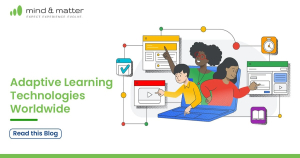Main Menu
Adaptive Learning Technologies Worldwide
Exploring how adaptive learning technologies are being implemented globally and their impact on personalized education
Adaptive learning technologies are revolutionizing the way education is delivered and experienced around the world. These technologies, which tailor educational content and experiences to individual learner needs, are increasingly being adopted in various regions, each with its unique implementation strategies and impacts. This blog explores how adaptive learning technologies are being implemented globally and their impact on personalized education.
North America: Embracing Personalized Learning Paths
In North America, particularly the United States and Canada, schools and universities are integrating adaptive learning technologies to provide personalized learning paths for students. These tools use algorithms to analyze a student's performance, adjusting the difficulty and topics of learning materials accordingly. For instance, platforms like DreamBox Learning in the U.S. offer mathematics education that adapts in real-time to the learner’s responses.
Europe: Focus on Multilingual and Cultural Adaptability
European educational systems, with their diverse languages and educational traditions, are leveraging adaptive technologies to offer multilingual support and culturally relevant content. This approach not only personalizes learning for language proficiency but also respects and integrates diverse cultural backgrounds into the learning process.
Asia: Technological Advancements Meeting Large-Scale Educational Needs
In countries like China, Japan, and India, there's a significant emphasis on using adaptive learning technologies to manage large student populations. These technologies offer scalable solutions to deliver personalized education, addressing the challenge of high student-teacher ratios. For example, platforms like Squirrel AI in China provide after-school tutoring that adapts to each student's learning pace and style.
Africa: Overcoming Educational Barriers
In African nations, adaptive learning technologies are seen as a solution to overcome barriers such as limited access to quality education and resources. These technologies can provide high-quality, personalized educational experiences in remote or under-resourced areas. Organizations like Eneza Education in Kenya use SMS-based platforms to reach learners in rural areas, offering tailored educational content.
Latin America: Enhancing Engagement and Reducing Dropout Rates
Latin American countries are adopting adaptive learning technologies to enhance student engagement and reduce dropout rates. By providing personalized and interactive learning experiences, these technologies can make education more appealing and relevant to students' lives and aspirations.
India: Navigating the Future of Customized Learning Solutions
India's adoption of adaptive learning technologies is revolutionizing its educational system, creating more personalized and engaging learning experiences. These technologies, leveraging data analytics and AI, are transforming traditional teaching methods and narrowing the educational divide in this culturally and linguistically diverse nation. Adaptive platforms offer tailored learning experiences, attuned to the individual needs, backgrounds, and languages of students. This is particularly beneficial in India, where educational content can be customized to suit varied learning paces and cultural contexts.
The focus on adaptive learning is also enhancing inclusivity in education. Students from remote or economically challenged areas now have access to quality education that adapts to their unique learning styles and abilities. This integration of technology in education reflects India's commitment to innovative, equitable solutions, preparing its youth for future challenges.
At the heart of this transformation is WOWL, a platform exemplifying the use of interactive and adaptive learning technologies. WOWL offers engaging, personalized educational experiences, significantly improving learning outcomes. Its distinct feature is the inclusion of native language speakers as teachers, enriching the authenticity and depth of language education. This aligns with India's aim of creating an innovative, inclusive learning environment, catering to its diverse demographic.
Global Impact: Democratizing Education
Globally, adaptive learning technologies are democratizing education by making it more accessible, efficient, and tailored to individual needs. They empower learners to progress at their own pace, offer targeted support where needed, and can even predict and prevent potential learning difficulties. This personalized approach not only enhances the learning experience but also prepares students for a future where adaptability and personalized skills are paramount.
Challenges and Future Directions
Despite their potential, adaptive learning technologies face challenges such as ensuring data privacy, preventing algorithmic biases, and requiring significant investments in digital infrastructure. However, as technology continues to evolve and awareness about its benefits grows, it's likely that more countries will adopt and further innovate in this field.
In conclusion, adaptive learning technologies are making significant strides globally, offering personalized, efficient, and inclusive education. Their ability to adapt to the unique needs of each learner is not just transforming educational experiences but also shaping the future of learning and teaching worldwide.

